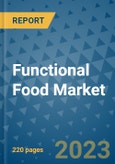Growing Need for Daily Fiber Intake Boosts Demand for Functional Foods
Consumers' growing awareness of the importance of meeting their daily recommended fiber intake is a key factor contributing to the increasing demand for functional foods. Brands are creatively fortifying consumer favorites such as cheese, bakery items, fried products, sauces, and beverages with fiber, promoting them as digestive products. This trend is expected to significantly drive the market for functional foods.Cardioprotective Diets Fuel the Demand for Functional Foods
The report highlights the rising prevalence of chronic diseases worldwide, which has compelled consumers to prioritize their nutritional deficiencies and turn to dietary and nutritional supplements. This trend is expected to significantly bolster the sales of functional foods. The cardiovascular health segment represents a quarter of the global functional food market valuation. With a growing consumer base avoiding red meat consumption due to its potential negative impact on heart health, there is an increasing inclination towards functional foods that benefit cardiac health, such as flaxseed, oats, stanol-ester margarine, and psyllium. The incorporation of functional foods into cardioprotective diets is expected to drive market growth.Pre and Probiotic Functional Foods Boost Sales
The increasing interest in pre and probiotics has propelled the market potential of functional foods such as cheese, yogurt, kefir, and cultured buttermilk. These products are anticipated to experience growing demand from a wide range of consumers, including infants and elderly individuals with chronic diseases. Probiotic functional beverages, in particular, are expected to remain popular among health-conscious consumers. The trends of gluten-free, dairy-free, sugar-free, and vegan diets will further contribute to market growth.Asian Consumers Drive Functional Food Sales with Shifting Preferences
Asia Pacific leads the global functional food market, exhibiting extraordinary growth rates. The Chinese market, in particular, presents a fertile ground for sales of fortified, naturally healthy, organic, and better-for-you products in the F&B industry. Brands are expected to emphasize the inclusion of traditional Chinese herbs in their functional food product launches. India also shows lucrative growth potential for the functional food market. The US market benefits from the rapidly growing popularity of functional F&B products, with functional beverages expected to be particularly attractive in terms of revenue generation. Brands have been strategically selling a majority of their product line-ups through large supermarket chains such as Lidl, Tesco, and Aldi, rather than relying on specialty stores.Key Players in the Functional Food Market
Leading companies in the functional food space, such as Mondelez International, Danone, General Mills, The Kraft Heinz Company, Dean Foods, Nestle, Unilever, Kraft Foods Inc, Marico, Yakult Honsha, Stonyfield Farm, Inc., Sanitarium Health, FrieslandCampina, Raisio Group, and Kellogg's, are driving innovation and growth in the industry.The global functional food market is set to expand as consumers increasingly prioritize their health and wellness, leading to a growing demand for functional food and beverage products.
Table of Contents
Companies Mentioned
- Nestlé S.A.
- General Mills Inc.
- The Kellogg Company
- Danone S.A.
- PepsiCo Inc.
- Arla Foods amba
- The Coca Cola Company
- Cargill Inc.
- Herbalife
- The Craft Heinz Company
- Archer Daniels Midland Company








